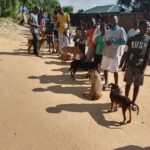Tetanus eliminated in Vietnam, Malawi waits
Published on May 16, 2013 at 2:17 PM by FACE OF MALAWI
The United Nations and its partners on May 15 announced that tetanus has been wiped out in more than 30 countries, including Vietnam, which previously had high rates of the illness.
According to a report of the Maternal and Neonatal Tetanus Elimination Initiative, since 1999, more than 118 million women of child-bearing age in 52 countries have been vaccinated against tetanus.
Many of these women received their tetanus vaccine as part of a campaign which included other life- saving interventions for children, such as immunization against measles, Vitamin A supplements, deworming tablets and information on umbilical cord care.
Tetanus kills one newborn baby every nine minutes and almost all of these babies are born in poor families living in the most disadvantaged areas and communities. The disease is transmitted when children are born in unhygienic conditions, and non-sterile materials are used to cut the umbilical cord, or are applied to the umbilical bump. At that point, the mother’s life is also in danger.
Tetanus is easily preventable with a vaccine administered to the mother. With at least three protective doses that cost about US$2, the mother and her future newborns are protected for five years.
In a press release, the Initiative said that despite the progress half the 59 priority countries, some 28 others, have yet to reach the elimination goal. The main challenges to wipe out the disease are a lack of access to communities because of insecurity, cultural barriers, competing priorities, and inadequate funding.
The countries that have eliminated maternal and neonatal tetanus are: Bangladesh, Benin, Burkina Faso, Burundi, Cameroon, China, Comoros, Congo, Cote d’Ivoire, Egypt, Eritrea, Ghana, Guinea Bissau, Iraq, Liberia, Malawi, Mozambique, Myanmar, Namibia, Nepal, Rwanda, Senegal, South Africa, Tanzania, Timor Leste, Turkey, Togo, Uganda, Vietnam, Zimbabwe and Zambia.
The Initiative is an international private-public partnership that includes national governments, the UN Children’s Fund (UNICEF), World Health Organization (WHO), UN Population Fund (UNFPA), the GAVI Alliance, USAID/Immunization Basics, Centres for Disease Control and Prevention, Save the Children, and the Bill & Melinda Gates Foundation, among others.


